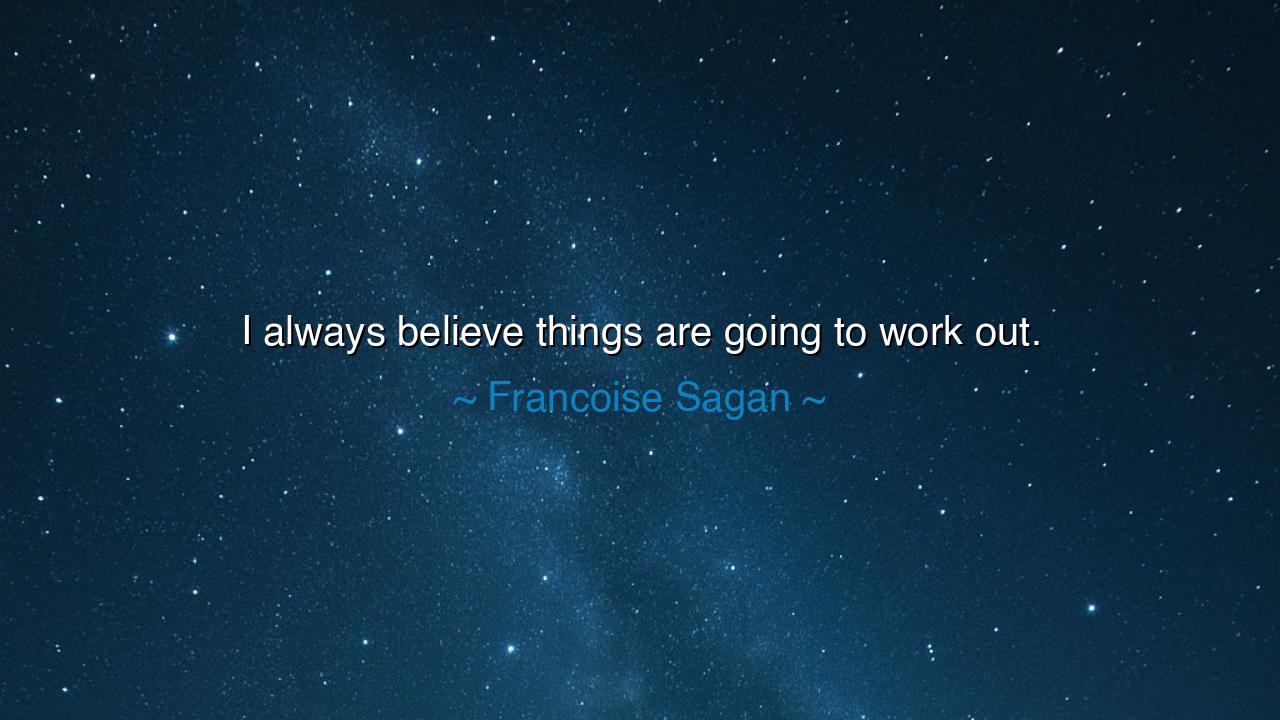
I always believe things are going to work out.






The words of Françoise Sagan—“I always believe things are going to work out”—shine like a quiet candle in the long corridors of human uncertainty. They are not the boast of the fortunate, nor the blindness of the naïve, but the declaration of a spirit that has chosen hope as its foundation. In these few, simple words lies the wisdom of endurance, the ancient strength of those who refuse despair. Sagan, the French novelist who rose to fame with Bonjour Tristesse while still a teenager, knew the turbulence of both success and suffering. Her life was not untouched by pain, scandal, or loss—and yet through all her trials, she kept this one conviction: that no matter how dark the path, life finds a way to heal itself.
To believe things are going to work out is not to deny the storm, but to trust that beyond the clouds, the sun still waits. It is a posture of the soul—a deliberate act of faith against fear. The ancients called this virtue fortitudo, the courage that holds fast when reason falters. For there will always come hours when the world seems broken, when plans unravel and hearts tremble. Yet in those very hours, belief becomes a shield. Sagan’s words remind us that belief is not a luxury—it is survival. It is the bridge that carries us from what is unbearable to what will one day make sense.
History itself bears witness to this eternal truth. Consider Nelson Mandela, who spent twenty-seven years in prison for his dream of freedom. Each day behind those bars could have crushed his will, each dawn could have whispered futility. And yet, he later said, “I am fundamentally an optimist. That part of me never left.” In him we see Sagan’s faith made flesh: a steadfast conviction that, despite the present’s cruelty, the future can be redeemed. When at last he walked free, his belief had not only worked out for himself but for a nation. His hope became the architect of change, proving that optimism, when rooted in purpose, is stronger than any chain.
But Sagan’s words speak not only to heroes—they speak to all who live the quiet struggles of daily life. To the artist whose work goes unseen, to the mother who labors in silence, to the heart that has been broken and must beat again—her belief is a gentle reminder that time is a healer, and that perseverance, like a patient river, wears down the hardest stone. She does not promise perfection or ease; she promises motion—the constant, miraculous turning of despair into dawn. This is the rhythm of existence itself: what falls will rise, what breaks will mend, what ends will begin again.
To believe things are going to work out is also to honor the hidden order of the universe. The philosopher Marcus Aurelius once wrote, “The world is change; life is opinion.” What he meant is that our suffering is shaped not by events themselves, but by the way we see them. Sagan’s faith belongs to this same lineage. Her optimism is not blind—it is a choice to see the pattern that underlies apparent chaos. In her view, the world, though cruel at times, is not meaningless. Every sorrow, every delay, every disappointment carries within it the seed of transformation. When we trust this unfolding, we align ourselves with the rhythm of creation itself.
And yet, belief is not passive. Sagan’s conviction carries the quiet power of action through faith. To believe that things will work out is not to sit idle; it is to rise each morning and take one more step toward the light. It is to build even while the foundation trembles, to plant even when the sky threatens rain. Hope, when genuine, is not the absence of struggle—it is the courage to continue through it. The world may call this foolish, but the wise know it as the essence of life.
Let this then be the teaching for all who hear: Believe that things will work out—not because the world is kind, but because you are steadfast. Hold to faith when reason fails you. Look upon each failure as a teacher, and each delay as a divine pause. Trust that your life, with all its contradictions and wounds, is still being woven into meaning. When darkness comes, do not curse it—light your small lamp, and move forward.
For as Sagan reminds us, belief is the quiet architect of destiny. To say, “I always believe things are going to work out,” is not a denial of hardship, but a proclamation of the soul’s resilience. It is the courage to keep walking when the path disappears, the wisdom to know that even broken ground can bear fruit. And in the end, this faith—simple, stubborn, luminous—is what saves us. For the world may test us, but those who believe will always find their way through the storm, and when the dawn comes, they will find that indeed, things have worked out—just as they dared to hope.






AAdministratorAdministrator
Welcome, honored guests. Please leave a comment, we will respond soon